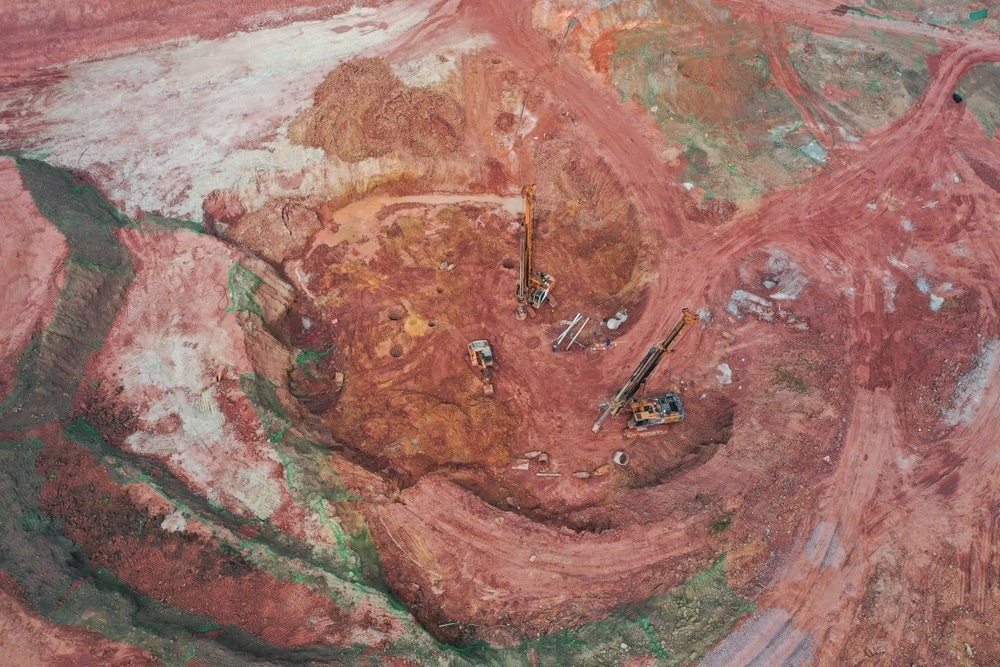Many of the required materials for renewable infrastructure and electronics come from rare earth minerals. Yet, mining has not been considered an environmentally friendly industry. New funding between Australia and India, and research at the University of South Australia, may establish ways of sustainably mining rare earths to support our electronics and green energy sectors.

Image Credit: bqmeng/Shutterstock.com
Despite their name, rare earth elements (REEs) are not rare. Also known as rare earths, they comprise 17 metallic elements, including lanthanides, scandium and yttrium. These materials are used in many of our electronics and modern-day technologies, making up many high-tech products such as computer hard drives, electric and hybrid vehicles, flat-screen monitors and televisions, and even other forms of electronic displays, lasers, radar and sonar systems.
World Supply of Rare Earths
Rare earth minerals and other metals used for batteries are important for global economies. However, supply is not reliable due to geological scarcity, politics and trade policy.
Most of the production of REEs comes from China. The U.S. Geological Survey’s news release: “Going Critical” explained that: “in 2008, China accounted for more than 90 percent of world production of REEs, and by 2011, China accounted for 97 percent of world production. Beginning in 1990 and beyond, supplies of REEs became an issue as the Government of China began to change the amount of the REEs that it allows to be produced and exported. The Chinese Government also began to limit the number of Chinese and Sino-foreign joint-venture companies that could export REEs from China."
While there is a limited supply of REEs, there is also a projected increase in demand due to the green transition as more rare earth minerals will be needed to create sustainable infrastructures such as wind turbines and car batteries.
For any minerals, mining techniques have not been known to be particularly environmentally friendly, sometimes causing pollution in natural waterways or disturbing local biodiversity.
The extraction process for minerals such as rare earths is very damaging to the environment, as conventional mining techniques have produced great volumes of toxic and radioactive materials.
Australia Leading the Way in Sustainable Mining
What if there was a way to mine sustainably for these much-needed minerals of the future? Currently, researchers from the University of South Australia are developing eco-friendly mining techniques for rare earth extraction.
The team is studying two metal recovery processes for extracting metals from ores, involving resin in pulp or moist mix, to help remove harmful substances from water and soil. If these methods indeed help to cut negative environmental impacts, REE mining could see an increasingly prosperous future during the green transition.
Mineral and resource engineer Dr. Richmond Asamoah, and research fellow at the Future Industry Institute (which is part of the University of South Australia) is finding new ways of safely extracting these minerals from ore processing, tailings reprocessing, and wastewater treatments. He is also finding ways to recycle products from scrap magnets and batteries in a safe manner.
Asamoah commented in an IT News article that “Accumulated mining wastes are becoming an increasingly valuable source of metals and energy, but because there’s a lack of productive and economically viable extraction technologies, there’s also a notable loss of valuable metals.”
“Rare earth elements contribute nearly $200 billion to the Indian economy, yet despite India having the world’s fifth largest reserves of critical metals, they mostly import their rare earth needs from China.
“This project hopes to enable Australia to export rare earth minerals to India, as an alternative to China, as well as to empower India to establish eco-technologies to extract minerals and metals within their own borders,” he added.
It will be interesting to see what happens next after the news that the University of South Australia gained funding from the Australia-India Strategic Research Fund, helping Australia and India to raise their bar on sustainability.
The research grant will offer major benefits to both countries, particularly as rare earths contribute nearly $200 billion to the Indian economy, which mostly imports these materials from China. This could allow Australia to export rare earths to India as an alternative to China while allowing India to sustainably extract minerals on their own territory.
Sustainable Rare Earths in the UK
Similar trends can be seen in the UK.
Saltend Chemicals Park will be the UK’s first rare earth processing facility, breaking dependence on China while also cutting the associated transportation costs and emissions.
Located in the Humber Local Enterprise Partnership, in collaboration with Wood Group, the project will create the world’s first fully sustainable magnet metal supply chain.
Gerry Grimstone, UK Minister for Investment said in a news release by Powder Metallurgy Review: “We very much welcome the proposal to establish a fully-sustainable rare earth oxide magnet metal processing facility in the Humber region. This facility is an important step in the establishment of a permanent magnet supply chain in the UK which could support a range of industries important to building back greener and our Net Zero ambitions.”
The Future of Mining Rare Earth Elements Sustainably
References and Further Reading
Improving environmental impact of mining rare earths: University of South Australia [Online]. Digital Nation. Available at: https://www.itnews.com.au/digitalnation/news/improving-environmental-impact-of-mining-rare-earths-university-of-south-australia-578751
What are rare earth elements and why are they important [Online]. American Geosciences Institute. Available at: https://www.americangeosciences.org/critical-issues/faq/what-are-rare-earth-elements-and-why-are-they-important
Australia-India Grant to research new critical minerals extraction tech. [Online] Academic Gates. Available at: https://www.academicgates.com/news/story/australia-india-grant-to-research-new-critical-minerals-extraction-tech/11453
UK rare earth facility to offer a sustainable magnet metal supply chain [Online]. Power Metallurgy Review. Available at: https://www.pm-review.com/uk-rare-earth-facility-to-offer-a-sustainable-magnet-metal-supply-chain/
Disclaimer: The views expressed here are those of the author expressed in their private capacity and do not necessarily represent the views of AZoM.com Limited T/A AZoNetwork the owner and operator of this website. This disclaimer forms part of the Terms and conditions of use of this website.